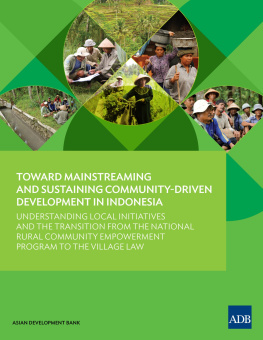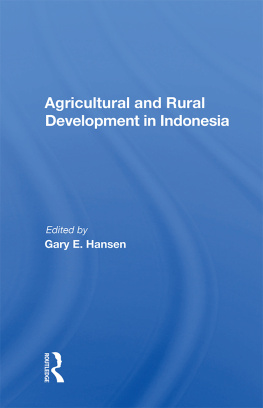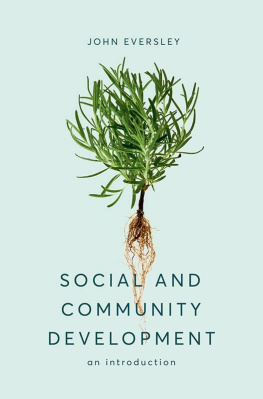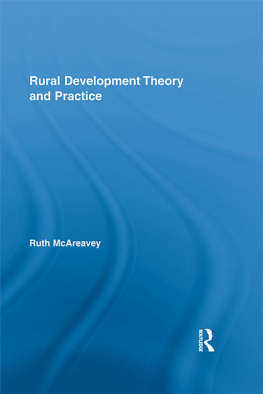Rural Development
Principles and Practice
Malcolm J. Moseley

Rural Development
Malcolm J. Moseley 2003
First published 2003
Apart from any fair dealing for the purposes of research or private study, or criticism or review, as permitted under the Copyright, Designs and Patents Act 1988, this publication may be reproduced, stored or transmitted in any form, or by any means, only with the prior permission in writing of the publishers, or in the case of reprographic reproduction, in accordance with the terms of licences issued by the Copyright Licensing Agency. Inquiries concerning reproduction outside those terms should be sent to the publishers.

| SAGE Publications Ltd 6 Bonhill Street London EC2A 4PU SAGE Publications Inc 2455 Teller Road Thousand Oaks, California 91320 SAGE Publications India Pvt Ltd B-42, Panchsheel Enclave Post Box 4109 New Delhi 110 017 |
British Library Cataloguing In Publication data
A catalogue record for this book is available
from the British Library.
ISBN: 978-0-7619-4767-7
Library of Congress Control Number: 2002108292
Contents
Preface
This book aims to distil much of what I have learned in the past 15 years or so about the local promotion of rural development in Britain, Ireland and continental Europe. In that regard I was fortunate to be, from 1987 to 1993, the first director of ACRE, the national voluntary organisation committed to promoting the vitality of Englands villages and small towns and to improving the quality of life of their more disadvantaged residents. And from 1993, to the present day, I have been equally fortunate to work as a researcher, teacher and consultant in the Countryside and Community Research Unit of what is now Englands newest university, the University of Gloucestershire.
During those 15 years, frequent contact with policy-makers and practitioners engaged in rural development, with unpaid activists working at the local level and with a variety of students, some of them already with a foot in the world of practice, persuaded me of the need for a concise text on the challenge of undertaking locally focused rural development. Hence this attempt to draw together a mixture of evidence and opinion around a number of core themes or issues, one per chapter, which together embrace much of the substance of that challenge.
In writing, I have borne in mind four types of potential reader. The first is undergraduate and masters-level students taking courses in rural something, for example rural geography, sociology, economics or planning, and for whom some understanding of local development is important. Also relevant in academia are research students, and researchers more generally, coming into rural development from more specialist backgrounds. The second type is a range of local or national activists keen to improve the well-being of our rural communities for example parish clerks, local councillors, members of local voluntary bodies and of local and national amenity or social welfare organisations. Third are those salaried practitioners who find themselves engaged in some aspect of rural development despite having received little or no formal training in the subject. Such people generally work in local or central government and the various development agencies and partnerships. Fourth is a variety of specialists in related professions and disciplines, such as community workers, conservation officers, agriculturists and land-use planners, who want to learn more about a related endeavour.
As for the approach, each chapter attempts to link theory and practice, giving roughly equal weight to each. Theory because it seeks to structure and make sense of the mass of seemingly unconnected facts to which we are otherwise confined; practice because it serves to ground theory in the muddy and murky world of real-world struggles to get things done. It is theory and practice taken together that best meets the needs of students and practitioners of rural development, who each tend in my experience to have a commendable aversion both to theory for theorys sake and to the indiscriminate accumulation of facts, case studies and examples of good practice.
Next, a confession. About one third of the 200 or so references to literature cited in the text are books, papers or reports written either by myself often with colleagues or by/for the two rural development agencies with which I have had most dealings over the past decade. These are the Brussels-based LEADER Observatory and Englands Rural Development Commission (plus the Countryside Agency, into which the latter was subsumed in 1999). This selectivity reflects more my goal of drawing substantially on personal experience than any suggestion that those sources contain a disproportionate share of what is worth knowing on the subject.
As for the content of the book, an introductory chapter sets out the underlying argument and structure and is followed by 13 substantive chapters which fall into two groups. First are nine devoted to overarching concepts or themes in rural development. Not the, much less the only, concepts or themes but nine which after some thought seem to capture most of what is significant. Certainly sustainability, innovation, adding value, entrepreneurship, community, social inclusion, accessibility, partnership and community involvement all occur time and again in the recent literature on rural and local development. It may well be that further chapters, perhaps on capacity building, networking, integration and governance, to name just four other contenders for inclusion, would also have been appropriate. But each is covered to some extent in one or other of the nine thematic chapters.
The remaining four chapters are devoted to particular aspects of the systematic pursuit at a local level of those overarching themes. They relate to the diagnosis of a local area, strategic planning, implementation and evaluation. But the distinction between the two groups of chapters is not clear-cut. Certainly many of the themes of the first group of nine chapters are effectively means, as well as ends, of local rural development. Indeed, the fact that product and process are inherently intertwined and sometimes interchangeable is one of the great lessons of local development repeated time and again in this book.
All 13 chapters follow a common format. The first part is a concise statement of the particular concepts significance in a rural development context, and a suggested definition of it. The second is a brief consideration of some key issues surrounding it, again from a rural development perspective. The third is the toolkit a listing and brief critique of a number of ways of practically pursuing or undertaking the concept or task in the real world.
After that come two case studies per chapter, 28 in all, collectively comprising about one third of the book. Each has been chosen and written to illustrate key issues raised in the immediately preceding text and to help link theory and practice. Seventeen of the 28 present work in which I was involved as a practitioner, researcher or consultant and a further six relate to programmes or initiatives of which I have personal knowledge. The other five have been condensed from the literature to best illustrate some aspect of practice outside my direct experience. Twenty-one of the total relate exclusively to some part or parts of the UK and the other seven to places in one or more of the other member states of the European Union (see the map which follows).
Next page







